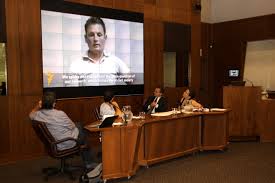(Eurasianet) As news trickled out of Taijkistan on July 22 that the government was releasing, albeit with some restrictions, international scholar Alexander Sodiqov after five weeks in jail, a group of scholars and activists gathered at New York University to discuss the long-term effects of his detention. The case, panelists cautioned, could signal on-going trouble for academic freedom for scholars focusing on Tajikistan.
Sodiqov, a political science doctoral student at the University of Toronto and a Tajik national, first traveled to his home country in June as part of a University of Exeter (UK) research project on conflict management strategies. He was detained in Khorog on June 16, before being brought to the intelligence agency headquarters in Dushanbe, where he remained until July 22, accused of espionage. […]
“The region thrives on conspiracy theories. Having knowledge – having data – is extremely threatening to these governments,” Alexander Cooley, a political science professor focusing on Central Asia at New York’s Barnard College, affirmed. “Alexander’s detention has had an effect: it’s going to deter research. It’s making this muddled environment even worse.”
See the full article © Eurasianet











